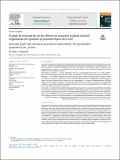Évaluer le concept de soi des élèves en contexte scolaire inclusif : exploration des qualités psychométriques du CoSoi
Assessing pupils’ self-concept in an inclusive school setting: The psychometric properties of the CoSoi

Type de référence
Date
2021Langue de la référence
FrançaisEntité(s) de recherche
Résumé
Objectif : Analyser les qualités psychométriques d’un questionnaire mesurant le concept de soi en contexte scolaire, en explorant l’influence des mesures de soutien à l’inclusion en classe ordinaire sur les dimensions du concept de soi et l’intégration sociale des élèves ayant des besoins éducatifs particuliers (BEP) et leurs camarades de classe.
Participants et méthode : Au total, 568 élèves de Suisse romande âgés entre 8 et 9 ans (48 % de filles), dont 173 bénéficiaient de mesures de soutien, ont répondu au CoSoi et à des matrices sociométriques.
Résultats : Les résultats confirment une structure en quatre facteurs invariante selon le genre et selon les mesures de soutien à l’inclusion. Seul le modèle tridimensionnel est également invariant selon le degré. Les deux dimensions du concept de soi académique (i.e., Langue et Mathématiques) diffèrent selon le genre. Bien que les élèves ayant des BEP rapportent des niveaux de concept de soi académique inférieurs, aucun effet négatif des pratiques inclusives sur le vécu socio-émotionnel de ces élèves et de leurs camarades de classe n’est constaté.
Conclusion : Les mesures de soutien n’apparaissent pas impacter le concept de soi des élèves en général, ni l’intégration sociale des élèves ayant des BEP. Le CoSoi apparaît être un instrument de mesure indiqué pour estimer l’impact de ces mesures sur le fonctionnement social de la classe ou le bien-être des élèves, qu’ils soient identifiés comme ayant des BEP ou non. Il peut également permettre d’évaluer l’efficacité des pratiques inclusives en classes ordinaires, en complément des évaluations de performances scolaires.
Résumé traduit en anglais
Objective: For several years now, the educational system in Switzerland has aimed to develop inclusive schooling. There are still questions about the effectiveness of support measures implemented to help in the inclusion of pupils with special educational needs in regular classrooms and their possible influence on pupils’ self-perception. Self-concept is defined as a multifaceted self-representation, developed through environmental experiences and significant others. In school settings, the dimensions of self-concept refer to academic (i.e., language learning and mathematics) and nonacademic (i.e., social) domains. The CoSoi is an easy-to-administer questionnaire that measures academic and social self-concept as well as attitudes towards school. Thus, the objective of the present study is to explore the psychometric properties of the CoSoi while considering the influence of support measures in the regular classroom on self-concept and social integration of pupils with special educational needs and their classmates. Method: A sample of 568 pupils in a French-speaking area of Switzerland (48% girls ; 173 pupils receiving support measures; 8–9 years-old) completed the CoSoi and sociometric matrices. Confirmatory factor analyses (CFA) were performed to compare two different models (i.e., a four-dimensional and a second order three-dimensional model). Then, the factorial invariance of the scale was tested across gender, grade and pupils with or without support measure. Finally, differences in levels of self-concept and social integration were tested using repeated measure ANOVAs. Results: The results of CFA indicate that indices of the two models tested showed satisfactory fit to our data. The four-factor model was invariant across gender and support measures, whereas the second order three-factor model was also invariant across grade. Although the two dimensions of academic self-concept (i.e., language learning and mathematics) differed by gender, there was no significant effect of the support measures received. Despite lower levels of academic self-concept than their classmates, the observed gap of pupils receiving support measures did not increase over the course of the year. In addition, levels of social self-concept were relatively high and stable over time. Conclusion: The results of the present study indicated that the support measures implemented did not seem to negatively affect pupils’ self-concept or self-perception regarding their social integration in the regular class. Pupils with special educational needs did not experiment increased marginalization or discrimination during the school year. In conclusion, the CoSoi appears to be an appropriate measure for estimating the degree to which the implementation of inclusive education may impact the classroom's social functioning or the pupils’ well-being, whether or not they are identified as having special educational needs. It can also be used to assess the effectiveness of inclusive practices in regular classrooms as a complement to measures of achievement. This questionnaire allows to take into account the global construct of academic self-concept, and it has the advantage of being quick and easy to administer.Titre du périodique
Neuropsychiatrie de l'enfance et de l'adolescenceMaison d’édition
Société française de psychiatrie de l'enfant et de l'adolescent et disciplines associées - ElsevierPays d'édition
Francep-ISSN
0222-9617Evaluation par les pairs (peer reviewing)
ouiPortée nationale / internationale
internationaleVolume / tome
69Fascicule
4Pagination
176-184Public(s) cible(s)
Chercheursprofessionels du domaine
URL permanente ORFEE
http://hdl.handle.net/20.500.12162/4904Autre(s) URL(s) permanente(s)
http://doi.org/10.1016/j.neurenf.2021.04.002https://doi.org/10.1016/j.neurenf.2021.04.002
La publication existe uniquement sous forme électronique
ouiDocument(s) associé(s) à la référence
Texte intégral :
Fichier
Accès
Commentaire
Version
Taille
Sur demande
Version disponible en Open Access sur le site de l'éditeur
postprint éditeur
849.7ko
- Tout ORFEE
- Détail référence



